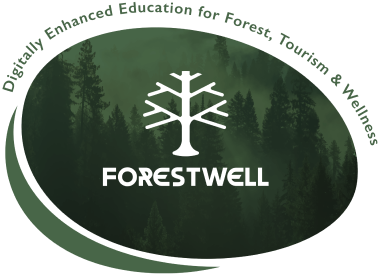Topic Progress..
Overview of Topic 7.4 Other Approaches to Involve Guests and The Community provides practical examples of approaches and strategies for integrating guests, stakeholders and communities into ForestWell projects to promote inclusivity, sustainability, and mutual benefit.
Remember successful ForestWell initiatives hinges on the meaningful involvement of local communities. By engaging residents in the development, implementation, and management of these projects, you can ensure that your offerings are sustainable, inclusive, and culturally rich. This community-centric approach not only enhances the effectiveness of ForestWell initiatives but also contributes to the social, economic, and environmental well-being of the communities involved.
Forest Well-Being Workshops and Seminars: Organise workshops and seminars in both urban and rural settings to educate people about the physical, mental, and emotional benefits of spending time in forests. Invite experts, such as forest therapists, wellness practitioners, and environmental scientists, to lead informative sessions.
Forest Immersion Programs for Schools: Develop forest immersion programs tailored for schools and educational institutions. These programs can include field trips, outdoor classrooms, and nature-based curricula.Collaborate with teachers and educators to integrate forest well-being into their teaching plans.
Community Engagement Events: Host community events in forested areas, such as family-friendly nature walks, mindfulness sessions, and wellness festivals. Encourage local residents to participate and experience the well-being benefits firsthand.
Indigenous and Local Community Partnerships: Build partnerships with indigenous and local communities living near forested areas. Involve them in ForestWell initiatives and respect their traditional knowledge. Collaborate on cultural exchanges and educational programs that promote a deeper understanding of local cultures and their relationship with the forest.
Environmental Education Programs: Develop educational programs focused on forest ecology, biodiversity, and the importance of conservation. Target schools, youth groups, and community organizations to enable an appreciation for the natural world and a sense of stewardship.
Forest Restoration Projects: Engage local communities in forest restoration projects, such as tree planting and trail maintenance. Organise volunteer days and community clean-up efforts to instill a sense of ownership and responsibility for the forests.
Community Advisory Boards: Establish community advisory boards comprising local residents, indigenous representatives, and stakeholders. Seek their input and guidance in the planning and execution of ForestWell programs. Use their insights to address community concerns and ensure that ForestWell initiatives align with community values.
Public Awareness Campaigns: Launch public awareness campaigns through various media channels, including social media, newspapers, and radio. Highlight the importance of well-being, nature immersion, and responsible eco-tourism in forested areas.
Collaborative Events and Festivals: Partner with local communities to organize forest-themed events and festivals that celebrate the natural beauty and cultural richness of the region. These events can promote eco-tourism and showcase the economic benefits of responsible forest-based tourism.
Community Benefit Sharing: Implement community benefit sharing programs where a portion of the proceeds from ForestWell initiatives is reinvested into local communities for infrastructure development, education, and healthcare.
Youth and Youth Leadership Programs: Develop programs that empower youth from local communities to become forest ambassadors and leaders. Encourage them to take an active role in environmental conservation and well-being advocacy.
Online Educational Resources: Create online resources, including articles, videos, and interactive maps, that educate people about forest ecosystems, well-being practices, and ForestWell opportunities. Make these resources accessible to a global audience.
Feedback and Listening Sessions: Host regular feedback sessions with community members to address concerns, gather suggestions, and build a sense of transparency and trust.
By educating people and involving communities in ForestWell initiatives, the initiative can create a mutually beneficial relationship where well-being, conservation, and cultural appreciation thrive. These efforts contribute to the long-term sustainability and impact of ForestWell programs while enriching the lives of individuals and the communities they touch.
